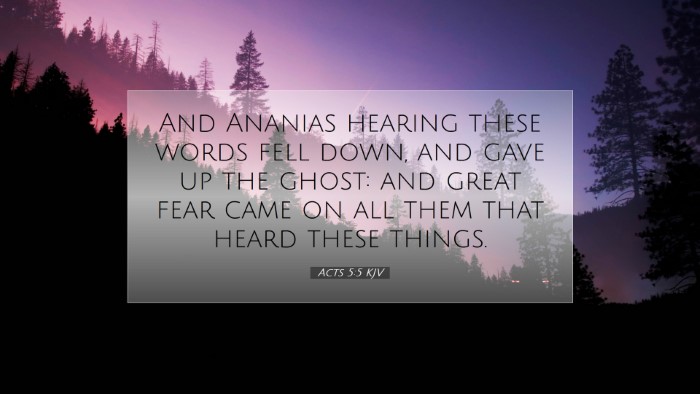Commentary on Acts 5:5
Verse Reference: Acts 5:5 - "And Ananias hearing these words fell down, and gave up the ghost: and great fear came on all them that heard these things."
Introduction
The account of Ananias' death in Acts 5:5 serves as a powerful and sobering illustration of divine judgment. This moment in the early Church reflects not only the seriousness of sin but also the presence and power of the Holy Spirit within the community. The commentaries of Matthew Henry, Albert Barnes, and Adam Clarke provide vital insights into this profound event.
Contextual Overview
Acts 5 follows the dramatic events of Acts 4, where the believers demonstrated unity and generosity. The phenomenon of communal sharing was unprecedented; however, Ananias and his wife Sapphira's deceit introduced a dire contrast. It is crucial to consider the broader implications of their actions within the context of the nascent Church, focalizing on integrity and the Holy Spirit's role.
Insights from Matthew Henry
Integrity and Divine Judgment
Matthew Henry highlights the gravity of Ananias' sin: he lied not just to the apostles but fundamentally to the Holy Spirit (Acts 5:3). Such deception indicates an attempt to present a façade of piety while harboring selfish motives. Henry emphasizes that Ananias’ fall serves as a striking reminder of God's intolerance of hypocrisy within the church. The immediate nature of Ananias' judgment evokes a sobering reverence for God's holiness.
Fear of the Lord
Henry further notes that great fear fell upon all who witnessed the event. This fear is not merely terror but a profound awe at God's authority and presence. Such reverence is crucial for the health of the church, fostering a culture of accountability and holiness among believers. It establishes a boundary against sin and a motivation towards authentic living.
Insights from Albert Barnes
Understanding the Fear of God
Albert Barnes stresses the significance of the phrase "great fear came upon all." This fear is a response to witnessing the consequences of sin in the presence of God. He suggests that this awe and fear served to purify the community and reinforce the seriousness with which they should regard God's holiness. The event aligns with biblical themes where the fear of the Lord is the beginning of wisdom (Proverbs 9:10).
Consequences of Deception
Barnes also discusses the stark realization that dishonesty can lead to dire consequences in a spiritual context. Ananias' actions demonstrated that no one could conceal their motives from God. This event challenges believers, then and now, to examine their integrity and the authenticity of their witness. The loss of Ananias also serves as a tragic reminder of the spiritual repercussions of sinfulness.
Insights from Adam Clarke
The Role of the Apostles
Adam Clarke emphasizes the role of the apostles in administering church discipline, noting, “Peter said, Ananias, why hath Satan filled thy heart to lie to the Holy Ghost?” Clarke points out that Peter was discerning the spiritual condition of Ananias and addressing the societal implications of such hypocrisy in the community. This speaks to the importance of pastoral oversight in maintaining church purity and addressing sin.
Ananias' Fate and divine justice
Clarke also reflects on the consequences of Ananias’ actions. His immediate judgment reinforces the theme of divine justice. The early Church knew that God was actively participating in their community and that any form of deceit was met with serious repercussions. Clarke’s insights urge believers to consider the weight of their actions and the sincerity of their devotion.
Theological Implications
The incident with Ananias raises significant theological questions regarding the nature of sin, the presence of the Holy Spirit, and the concept of divine judgment. The narrative asserts that God’s holiness necessitates a proper response from His people, who are called to live in truth and integrity.
- Integrity in Community: The early Church experienced a strong sense of community; therefore, integrity was paramount. Ananias’ downfall illustrates the danger of duplicity within a shared faith.
- Divine Authority: The swift judgment affirms God's sovereign authority over the Church and His intolerance for hypocrisy.
- The Role of the Holy Spirit: This passage evokes a deeper understanding of the Holy Spirit as both a comforter and a witness to truth; He is not only present in blessing but also in judgment.
Conclusion
Acts 5:5 encapsulates a pivotal moment in the early Church, echoing through the ages a call to integrity, transparency, and reverent fear of God. The insights provided by Henry, Barnes, and Clarke invite us to reflect on our own lives and churches, urging a commitment to authenticity in our spiritual journeys. As believers, we are called to uphold the values of the Kingdom, ensuring that our actions reflect our faith while remaining mindful of the transformative power of God’s presence.


